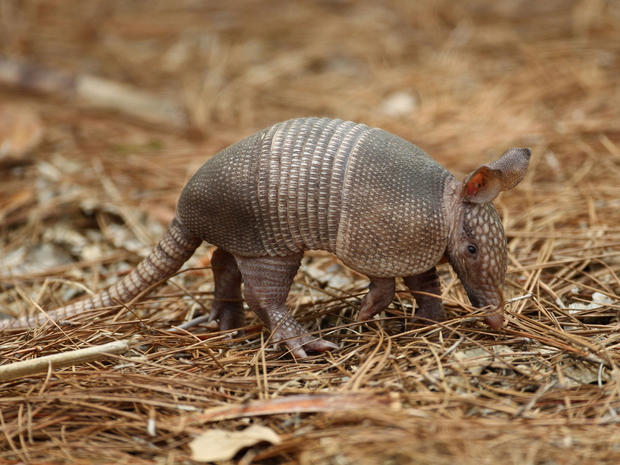Leprosy outbreak tied to armadillos: Which states are at risk?
(CBS/AP) LOS ANGELES - They may seem like strange bedfellows, but scientists now believe the tiny nine-branded armadillo is the cause of a big problem - spreading leprosy in the southern United States.
DNA tests show a match in the leprosy strain between some patients and these prehistoric-looking critters - a connection scientists had suspected but until now couldn't pin down.
"Now we have the link," said James Krahenbuhl, who heads a government leprosy program that led the new study.
The actual risk of getting leprosy from an armadillo is quite low because most people who get exposed don't get sick with the ancient scourge, known medically as Hansen's disease. But that doesn't mean there's no risk at all. In some states, like Texas and Louisiana, armadillos are hunted and eaten as a delicacy. And that, say scientists is where the trouble comes in.
Of the 150 cases of leprosy cases each year in the U.S., researchers now believe a third may be caused by exposure to armadillos, usually through extensive handling or eating of the animals. Most leprosy cases are actually imported from the developing world where it is more common.
Report: Leprosy is India's secret epidemic
To make their case, scientists at the National Hansen's Disease Programs in Baton Rouge, Louisiana took DNA samples from 33 wild armadillos in Arkansas, Alabama, Louisiana, Mississippi and Texas.
Scientists also took skin biopsies from 50 leprosy patients being treated at a Baton Rouge clinic. Three-quarters had never had foreign exposure, but lived in Southern states where they could have been exposed to armadillos.
An analysis found that samples from the patients and armadillos were genetically similar to each other and were different from leprosy strains found elsewhere in the world. The unique strain was found in 28 armadillos and 25 patients.
Of the 15 patients for whom researchers had information, seven said they had no contact with armadillos; eight said they did, including one who routinely hunted and ate them.
While the work did not document direct transmission from animal to human, "the evidence is pretty convincing that it happens," said Dr. Brian Currie, an infectious disease expert at Montefiore Medical Center in New York, who had no role in the study.
The good news is the disease is curable with prompt treatment of antibiotics before complications set in. The drugs typically kill the bacteria within days and make it non-contagious. It usually takes a year or two to fully clear the germ from the body. Those most at risk of contagion are family members who are in constant contact with an untreated person.
If left untreated, leprosy can cause nerve damage so severe that people lose feeling in their fingers and toes, leading to deformity and disability. Which is why lead researcher Richard Truman offered some sage advice for those who love armadillo burgers: "Leave the animals alone."
